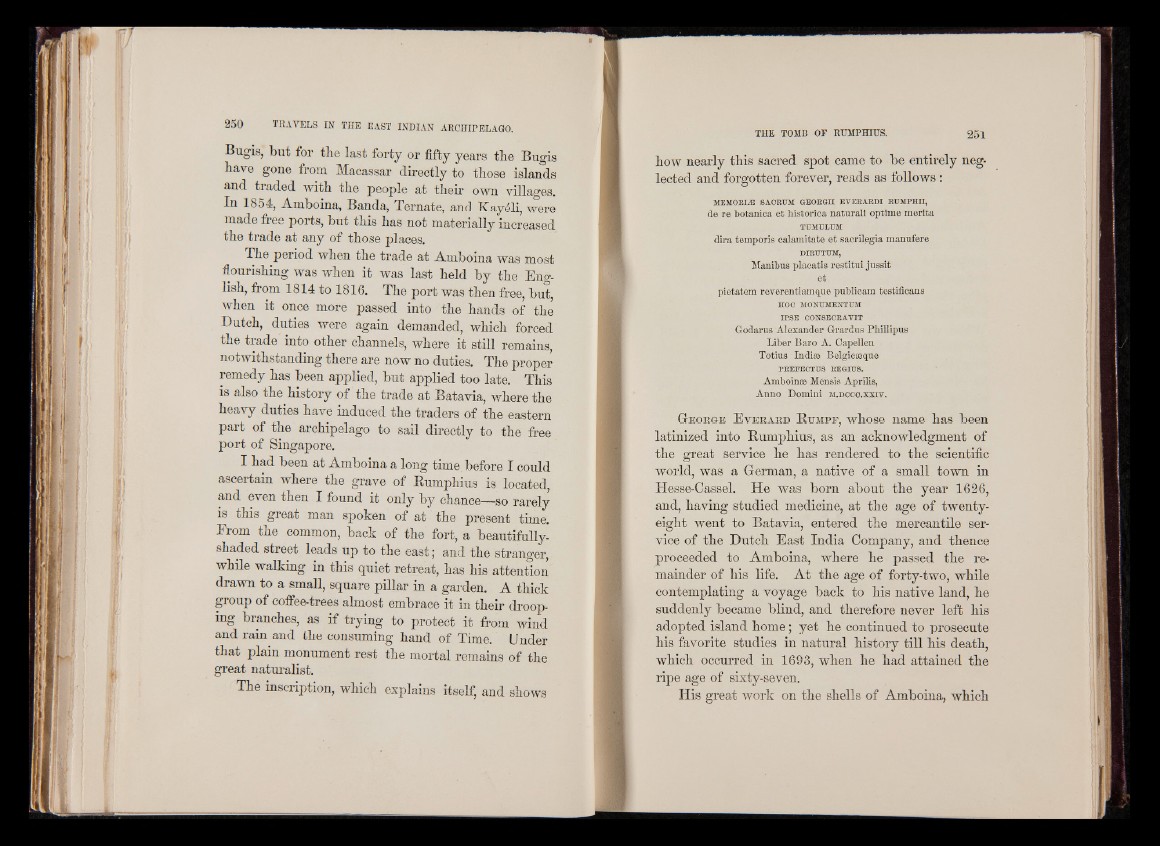
Bugis, but for the last forty or fifty years the Bugis
have gone from Macassar directly to those islands
and traded with the people at their own villages.
In 1854, Amboina, Banda, Ternate, and Kayeli, were
made free ports, but this has not materially increased
the trade at any of those places.
The period when the trade at Amboina was most
flourishing was when it was last held by the English,
from 1814 to 1816. The port was then free, but,
when it once more passed into the hands of the
Dutch, duties were again demanded, which forced
the trade into other channels, where it still remains,
notwithstanding there are now no duties. The proper
remedy has been applied, but applied too late. This
is also the history of the trade at Batavia, where the
heavy duties have induced the traders of the eastern
part of the archipelago to sail directly to the free
port of Singapore.
I had been at Amboina a long time, before I could
ascertain where the grave of Kumphius is located,
and even then I found it only by chance—so rarely
is this great man spoken of at the present time.
From the common, back of the fort, a beautifully-
shaded street leads up to the east; and the stranger,
while walking in this quiet retreat, has his attention
drawn to a small, square pillar in a garden. A thick
p-oup of coffee-trees almost embrace it in their droop-
ing branches, as if trying to protect it f r o m wind
and rain and the consuming hand of Time. Under
that plain monument rest the mortal remains of the
great naturalist.
The inscription, which explains itself, and shows
how nearly this sacred spot came to be entirely neglected
and forgotten forever, reads as follows:
MEMORL® SACRUM GEOEGTI EVEEARDI RUMPHII,
de re botanioa et historica naturali optime merita
TUMULUM
dira temporis calamitate et sacrilegia manufere
DIEUTUM,
Manibus placatis restitui jussit
et
pietatem reverentiamque publicam testificans
HOC MONUMENTUM
IP SE OON8EOEAVIT
Godarus Alexander Grardus Pliillipus
Liber Baro A. Capellen
Totins Indies Belgicaeque
PEEEEOTUS BEG-IUS.
Amboinas Mensis Aprilis,
Anno Domini m .d o o o .x x i t .
G e o r g e E v e r a r d R txmpf, whose name has been
latinized into Rumphius, as an acknowledgment of
the great service he has rendered to the scientific
world, was a German, a native of a small town in
Hesse-Cassel. He was born about the year 1626,
and, having studied medicine, at the age of twenty-
eight went to Batavia, entered the mercantile service
of the Dutch East India Company, and thence
proceeded to Amboina, where he passed the remainder
of his life. At the age of forty-two, while
contemplating a voyage back to his native land, he
suddenly became blind, and therefore never left his
adopted island home; yet he continued to prosecute
his favorite studies in natural history till his death,
which occurred in 1693, when he had attained the
ripe age of sixty-seven.
His great work on the shells of Amboina, which